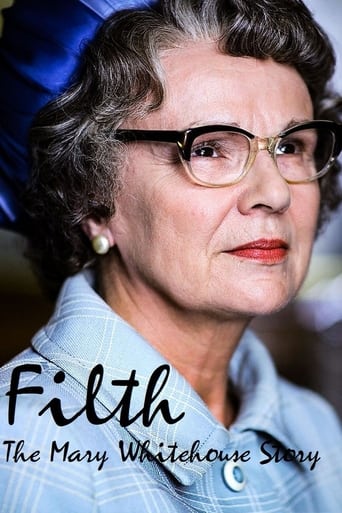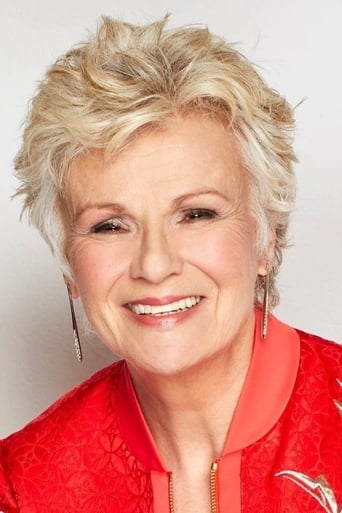

Filth: The Mary Whitehouse Story (2008)
The story of the rise of morals crusader Mary Whitehouse in the UK in the 1960's.
Watch Trailer
Cast
Reviews
Touches You
Such a frustrating disappointment
There are moments in this movie where the great movie it could've been peek out... They're fleeting, here, but they're worth savoring, and they happen often enough to make it worth your while.
The movie turns out to be a little better than the average. Starting from a romantic formula often seen in the cinema, it ends in the most predictable (and somewhat bland) way.
BBC's "Panorama" has yet to show an episode entitled "The Joy of Bestiality".Now that may be a matter of regret for some but I daresay most viewers are happy that censorship in some for or another is enforced at the national self - styled "centre of broadcasting excellence".Equally your children are unlikely to be confronted by CBBC transmitting "Paedophilia for Kiddies".In some small measure this circumstance prevails because a middle aged provincial schoolteacher took on the might and arrogance of the British Broadcasting Corporation nearly fifty years ago,and despite she and her family being vilified in the liberal press and of course by the BBC's coterie of in - house intellectuals who believe it is their God - given duty to shock us proles and mock our chavvish bourgeois morality. The D.G. of the BBC at the time was the megalomaniacal Sir Hugh Carleton - Greene who resisted any whiff of censorship with a rage Pavlov's Jack Russell would have been proud of. But,unbelievably,the peasants who supported Mrs Whithouse made up a significant proportion of his viewing figures and her steely determination - with the indefatigable support of her husband who was himself the victim of an appalling campaign of mockery by those oh - so - smug writers and producers who shamefully seized on the fact that he was involved(although blameless) in a fatal Traffic Accident at the height of his wife's campaign. Clearly quite mad it is a matter of shame that Carleton - Greene was able to hang onto his job for so long. But sometimes it does appear that God is on the side of the small battalions because Mrs Whitehouse won her personal war of attrition and the D.G. was forced to step down. His hatred of censorship did not extend to giving his opponents the right to reply,a nicety he did not lose any sleep over. In "Filth - the Mary Whitehouse story",Mrs Whitehouse is portrayed as a Mrs Grundy for the 1960s,the sort of woman who would place a cover over the legs of her piano. In settling for parody the producers have been fair - minded as the D.G. himself is made out to be a foul - mouthed, sexist skirt - chaser who presumably - we are meant to believe - wouldn't last ten minutes in the 21st century diversity - centred BBC.Well,maybe. Miss Julie Walters gives her considerable all in the title role,falling just the right side of caricature although her Brummie accent thickens considerably when the actress wishes to patronise. This is just an old battle in an old war now of course but,just occasionally,the Whitehouse Spirit resurrects itself when some overpaid oaf steps over the line and outrages the peasants(Viz:- Ross and Brand last year)and the Corporation is forced to rattle a few sabres. But,generally speaking we get the broadcasting media the "Guardian" readers deserve and the rest of us can either like it or lump it. I must admit that generally I choose to lump it.
Mary Whitehouse, who campaigned tirelessly to rid TV and cinema of the type of stuff I thrive on, is given a fair shake in "Filth - The Mary Whitehouse Story". Julie Walters, of "Educating Rita" fame, plays the woman as a well-meaning mother and educator who became increasingly appalled by any entertainment that didn't mesh with her puritanical take on life. Outraged by the new sexual permissiveness of the 60's, as depicted by the BBC, she waged a decades-long campaign that successfully put the brakes on much of what would now be considered typical TV fare for teenagers and adults. Most annoying aspect of this woman was that stupid people (plenty of them) bought into her moralistic hogwash and happily signed her petitions to ban or restrict anything she deemed corrupting; even "Dr. Who" did not escape her criticism. Despite what could have been a dour, hateful piece, there is a comical edge to "Filth..."that is represented by Mary's ongoing battle with the BBC's Sir Hugh Greene (Hugh Bonneville), a fellow I found immensely likable for his blatant rudeness, lechery, and foul-mouthery, not to mention his undying desire to deflect the missiles of censorship. Bonneville is great as the larger-than-life Greene and adds great bounce to the drama. The world is still filled with Mary Whitehouses who want to censor our movies, ban the filth we love so much on the internet, and launch witch hunts and obscenity trials ("Good Morning, Paul Little!") against unsuspecting artists. The difference between today's Mary Whitehouses and the original is that Mary, a card-cartrying prude, was at least sincere and consistent in her moral outrage. Today's opponents of "filth" are called politicians and preachers, and their outrage is fueled by their lust for votes, not a "better" world.
I never did have much truck with Mary Whitehouse. In the early days her heart was probably in the right place, bless her. She saw the onslaught of the permissive society as a catastrophe for the moral fibre of the nation while homosexuality and pre-martial sex were the start of the slippery slope to hellfire and damnation. She was right, to the teeniest, weeniest degree, about what our children should or should not be exposed to and that full frontal nudity and sodomy might do more than frighten the horses when we are about to sit down to our evening meal. But she was also a bigot, the narrowness of whose vision would have been awesome were it not so awesomely worrying. And she never listened; never took on board the opinion of anyone but herself."Filth" starts off portraying her as a sympathetic, matronly type, a school mistress with a genuine affection for her students, and a caring wife and mother, quite prepared to enjoy a bit of the old heave-ho herself in the sanctity of the marriage bed. But the moment television started to reflect the real world as it was in the early sixties, (heaving and ho-ing outside the marriage bed, cussing and swearing on every street corner), Mary had apoplexy and demanded that Sir Hugh Carleton Greene, Director General of the BBC, call a halt to it.Now I am not knocking morality. There is right and there is wrong and there is the expression of both but there is also freedom of speech; there are often two sides of almost every story and there's nowt as queer as folk, as they say. Mary simply didn't see it that way. She didn't so much quote the Bible as rewrite it in her own words. Interestingly, "Filth" began by making her sympathetic, (as I've said, her heart was in the right place), and making Carleton Greene the villain of the piece, (sexist, patronizing, condescending, arrogant, you name it), but as Mary's fame grew, (she came to love the limelight, the attention and above all, the power she wielded), our sympathies shifted to the poor, put-upon Greene, driven close to bonkers by this needling, insidious little woman.Were it not for the fact that she strove to silence all forms of expression with which she didn't agree, destroying reputations and careers as she went, she might just have been considered another eccentric and I worried that Julie Walters would play her as an extension of her eccentric persona's such as Mrs Overall. However, I really ought to have had more faith in Walters who is one of our finest actresses and who is outstanding here. (The fact that she made me almost like Mary is testimony to that). Hugh Bonneville, too, had a lot to do with making Greene change from arrogant snob to crusader to victim in the space of ninety minutes. (The film only concentrates on the period of the 'feud' between Whitehouse and Greene).Perhaps the writing could have been sharper at times, though the period was beautifully delineated from the outset. This was indeed a vanished England of simplicity and innocence that made you wonder, at least initially, if Mrs. W might not have been right about the tide of 'filth' that was coming down the tube to change it all. But as you watched her change from village school-ma-rm to Mussolini in a twin-set and pearls, you realized it wasn't the 'filth' was was the problem but the knight in very tarnished armour.
Although Julie Walters looks a bit like Caroline Aherne as her Mrs Merton character in quite a few scenes this is quite a true and very fair portrayal of Mrs Whitehouse. Whatever you think of her prudery and her lack of humour you actually feel sympathetic to her when she gets heckled at meetings and gets abusive letters and phonecalls. It's fair to say that the permissive society had an inpermissive nature, if you get my meaning. She was also not a lady to mess with and you said unfavourable things about her at your peril. The film mentions her successful defamation actions. It's fair to say that if you were up against Mrs Whitehouse in court your chances of success were slim. The end credits mention Whitehouse v Lemon (aka The Gay News Case) which was very much on the Pythons' minds when they made The Life of Brian. To her credit she was one of the first people to campaign against child pornography but she turned herself into a figure of fun by finding fault with Dr Who and Pinky & Perky. I wondered how on earth was Pinky & Perky corruptive? Well, I suppose it was. It inspired many 60s and 70s kids to play LPs at 78rpm and I think that might have been bad for the records. Sir Hugh Carleton-Greene is not portrayed favourably. He is shown to be arrogant, smug, coarse, foul-mouthed and lecherous. I have no idea what he was like as a person so I can't judge how fair a portrayal this was. Julie Walters these days is of course best known as Molly Weasley in the Harry Potter films and I imagined a scene where Sir Hugh gets a howler from Mary Whitehouse. The letter gets delivered by owl on his desk and then shouts, in Julie Walters' voice, "Hugh Carleton-Greene, I am absolutely disgusted" and then goes on to complain about the number of bloodys in Till Death Us Do Part, Dr Who having nightmare qualities etc and what kind of example certain programmes are to the young people of the country and then goes on in the gentler "Oh and Ginny dear" voice to say "Oh and last Sunday's Songs of Praise was lovely", then blowing a raspberry and self-shredding. Mrs Whitehouse died the year the first Harry Potter film came out. It's fair to say she'd have some criticisms to make of Harry Potter.


